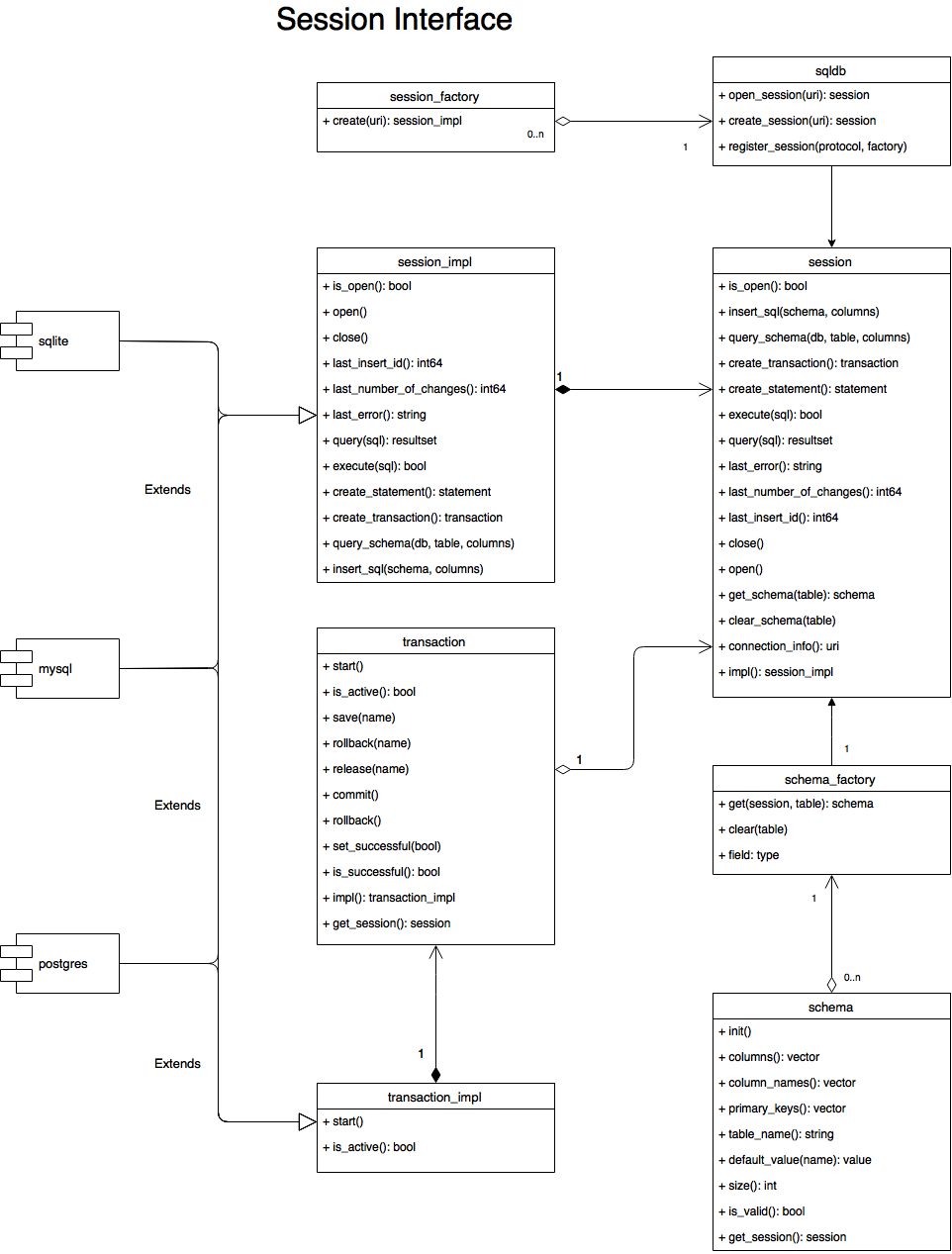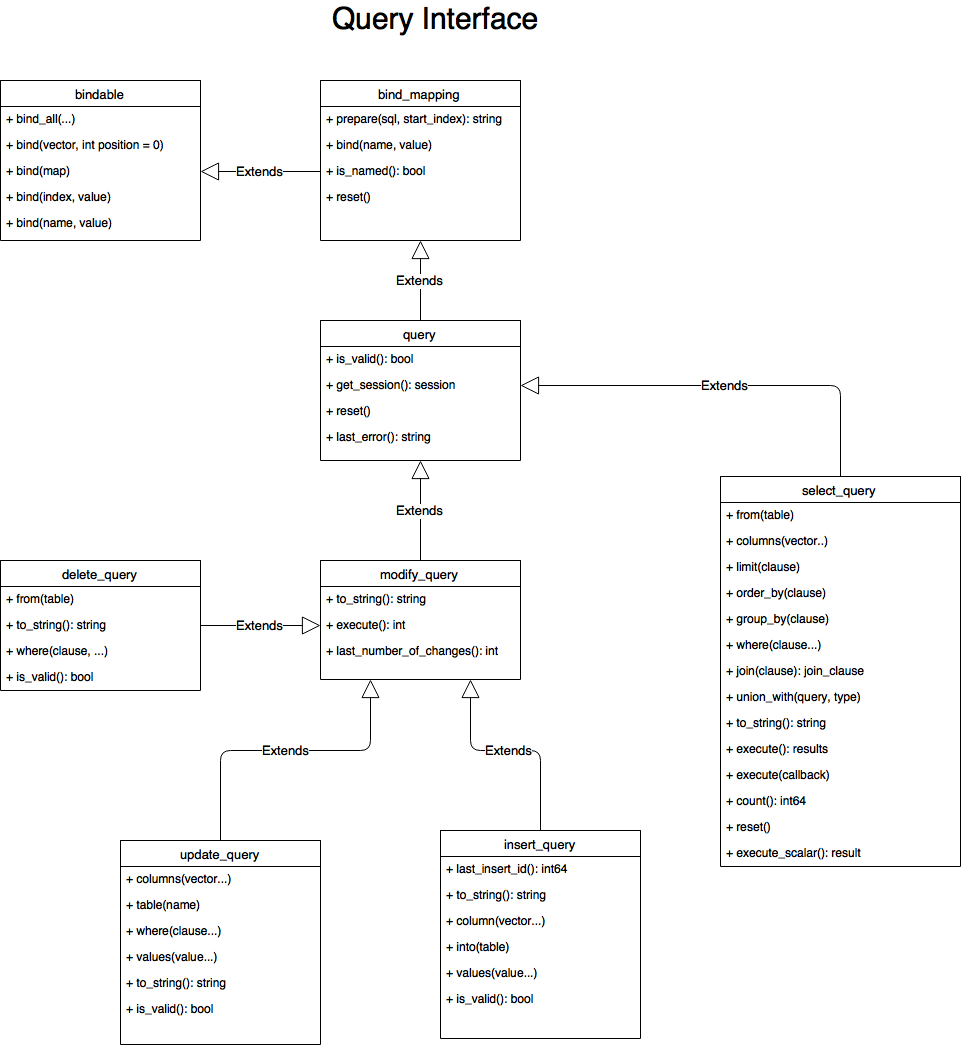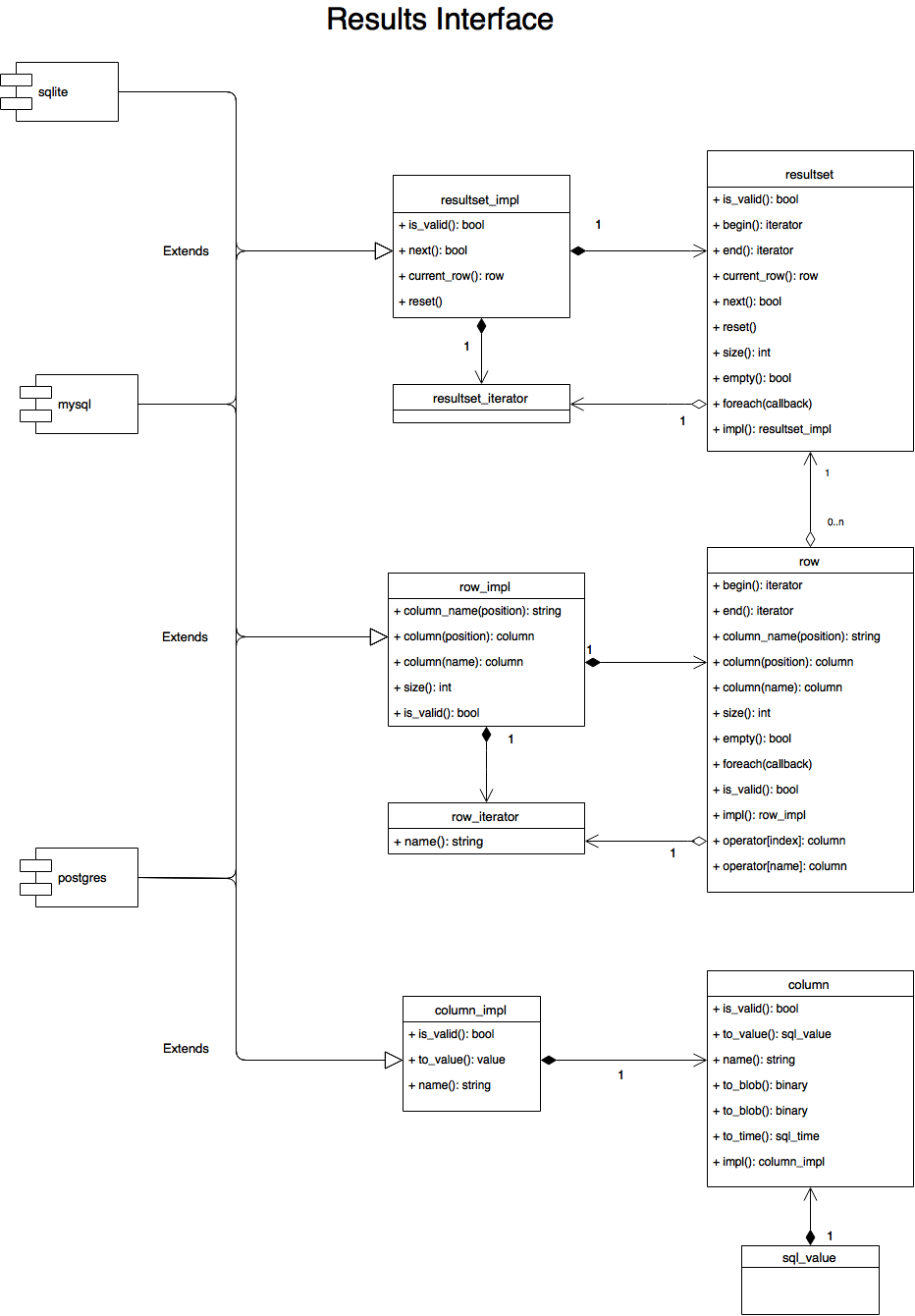a sqlite, mysql and postgres wrapper / active record (ish) implementation. use in production at your own risk, no support or warrenty.
Mostly for the challenge and to use newer features of c++11 in a database context. Other libraries have added C++11 after the fact.
After cloning run the following command to initialize submodules:
git submodule update --init --recursiveDocker builds are available, docker-compose will run the tests with mysql and postgres images:
docker-compose run testotherwise use cmake to generate for the build system of your choice.
mkdir debug; cd debug;
cmake -DCMAKE_BUILD_TYPE=Debug ..
make
make testoptions supported are:
-DCODE_COVERAGE=OFF : enable code coverage using lcov
-DMEMORY_CHECK=OFF : enable valgrind memory checking on tests
-DENABLE_LOGGING=OFF : enable internal library logging
-DENABLE_PROFILING=OFF : enable valgrind profiling on tests
-DENHANCED_PARAMETER_MAPPING=OFF : use regex to map different parameter syntaxes
-DENABLE_BENCHMARKING=OFF : benchmark with other database libraries
Debugging on docker can be done with docker compose:
docker-compose run test gdb /usr/src/build/tests/rj_db_test_xxx
Records should be implemented using the curiously re-occuring template pattern (CRTP).
First initialize a session
auto current_session = sqldb::create_session("file://test.db");
/* Other databases:
auto current_session = sqldb::create_session("mysql://user@pass:localhost:3306/database");
auto current_session = sqldb::create_session("postgres://localhost/test");
*/Create a record
extern std::shared_ptr<rj::db::session> current_session;
class user : public rj::db::record<user>
{
public:
constexpr static const char *const TABLE_NAME = "users";
/* only required constructor */
user(const std::shared_ptr<schema> &schema) : record(schema)
{}
/* default constructor */
user(const std::shared_ptr<session> &session = current_session) : record(session->get_schema(TABLE_NAME))
{}
/* utility method showing how to get columns */
string to_string() const
{
ostringstream buf;
buf << id() << ": " << get("first_name") << " " << get("last_name");
return buf.str();
}
// optional overridden method to do custom initialization
void on_record_init(const rj::db::row &row) {
set("customValue", row.column("customName").to_value());
}
// custom find method using the schema functions
vector<shared_ptr<user>> find_by_first_name(const string &value) {
return rj::db::find_by<user>(this->schema(), "first_name", value);
}
};The library includes the following schema functions for querying:
- find_by_id()
- find_all()
- find_by()
- find_one()
example using a callback:
auto schema = current_session->get_schema(user::TABLE_NAME);
find_xxx<user>(schema, ... [](const shared_ptr<user> &record) {
cout << "User: " << record->to_string() << endl;
});example using a return value:
auto results = find_xxx<user>(schema, ...);
for (auto user : results) {
cout << "User: " << record->to_string() << endl;
}Record objects have their equivalent methods using their internal schema:
/* find users with a callback */
user().find_xxx(... [](const shared_ptr<user> &record) {
cout << "User: " << record->to_string() << endl;
});
/* find users returning the results */
auto results = user().find_xxx(...);
for (auto user : results) {
cout << "User: " << record->to_string() << endl;
} /* save a user */
user obj;
obj.set("first_name", "John");
obj.set("last_name", "Doe");
if(!obj.save()) {
cerr << testdb.last_error() << endl;
} user obj;
obj.set_id(1);
if(!obj.de1ete()) {
cerr << testdb.last_error() << endl;
}By default and for performance, the library will use the prepared statement syntax of the database being used.
If you turn on ENHANCED_PARAMENTER_MAPPING at compile time, then the syntaxes are universal - including named parameters and mixing parameter syntaxes.
Enhanced parameter mapping example:
"?, $2, @name, $3"
// or
"?, ?, @name, ?"When mixing indexed parameters, the first '?' is equivalent to parameter 1 or '$1' and so on. Mixing parameter types is an area that has been tested, but nearly enough (03/13/16).
The binding interface looks like this:
// Bind all by order (index)
query.bind_all("value1", "value2", value3);
// or
query.where("param = $1 and param2 = $2", value1, value2);
// Bind by index
query.bind(2, value2);
// Bind by name
query.bind("@param", "value");
// Bind by generic type
sql_value value(1234);
query.bind_value(1, value);
// Bind by vector of values
vector<sql_value> values = { 1234, "bob", "smith" };
query.bind(values);
// Bind by a map of named values
unordered_map<string,sql_value> values = { {"@name", "harry"}, {"@id", 1234} };
query.bind(values);/* insert a user (INSERT INTO ...) */
insert_query insert(current_session);
/* insert column values into a table */
insert.into("users").columns("id", "first_name", "last_name")
.values(4321, "dave", "patterson");
if (!query.execute()) {
cerr << testdb.last_error() << endl;
} else {
cout << "last insert id " << query.last_insert_id() << endl;
}/* update a user (UPDATE ...) */
update_query update(current_session);
/* update columns in a table with values */
update.table("users").columns("id", "first_name", "last_name")
.values(3432, "mark", "anthony");
/* using where clause with named parameters */
query.where("id = @id") or ("last_name = @last_name");
/* bind named parameters */
query.bind("@id", 1234).bind("@last_name", "henry");
query.execute();/* delete a user (DELETE FROM ...) */
delete_query query(current_session);
query.from("users").where("id = $1 AND first_name = $2", 1234, "bob");
query.execute();
/* select some users */
select_query query(current_session);
query.from("users").where("last_name = $1 OR first_name = $2", "Jenkins", "Harry");
auto results = query.execute();
for ( auto &row : results) {
string lName = row["last_name"];
// do more stuff
}The select query also supports a call back interface:
select_query query(current_session);
query.from("users").execute([](const resultset & rs)
{
// do something with a resultset
rs.for_each([](const row & r)
{
// do something with a row
r.for_each([](const column & c)
{
// do something with a column
});
});
});
// use a function for a callback
std::function<void (const resultset &)> handler = [](const resultset &results)
{
printf("found %d results", results.size());
}
query.execute(handler);The join_clause is used to build join statements.
select_query select(current_session);
select.columns("u.id", "s.setting").from("users u")
.join("user_settings s").on("u.id = s.user_id") and ("s.valid = 1");
select.execute();Where clauses in select/delete/joins have a dedicated class. For me it is syntactically preferable to use the 'and' and 'or' keywords with the where clause operators. This is the same as calling the && || operators.
query.where("this = $1") and ("that = $2") or ("test = $3");The library will try to put the appropriate combined AND/OR into brackets itself. In the above example it would result in:
(this = $1 AND that = $2) OR (test = $3)
Grouping where clauses is also an area that has been tested, but not nearly enough (03/13/16).
The library supports batch mode by default. This means upon execution, its will reset the query to a pre-bind state.
/* execute some raw sql */
insert_query insert(current_session);
insert.into("users").columns("counter");
for(int i = 1000; i < 3000; i++) {
// set new values for the insert
insert.bind(1, i);
if (!insert.execute()) {
cerr << testdb.last_error() << endl;
}
}Perform raw queries on a session object:
auto results = session->query("select * from users");
if (!session->execute("insert into users values(...)")) {
cerr << session->last_error() << endl;
}Transactions can be performed on a session object.
{
auto tx = current_session->start_transaction();
/* perform operations here */
tx->save("savepoint");
/* more operations here */
tx->rollback("savepoint");
tx->release("savepoint");
// set successful to commit on destruct
tx->set_successful(true);
}
// tx will be commited hereA variant class is used for converting and storing data types. A few custom types exist:
A type for dealing with sql date/time formats.
time_t current_time = time(0);
/*
* create a DATE sql value
*
* can be DATE, TIME, DATETIME, TIMESTAMP
*/
sql_time value(current_time, sql_time::DATE);
/* binds the date to a query */
query.bind(1, value);
/* YYYY-MM-DD format */
auto str = value.to_string();size_t sz = 30;
void *data = malloc(sz);
/* set data here */
/*
* create a blob value, this will create a copy of the data
*
* you can pass function pointers to control how the data is allocated, freed, copied and compared
*/
sql_blob value(data, sz);
query.bind(1, value);Additional custom types can be implemented by subclassing variant::complex. For example, the JSON postgres type.
Here are some preliminary benchmarks on sqlite (see tests/benchmarks). Tested on mac osx pro using clang release mode.
sqlite insert 5000 406684 ns/op
sqlite select 2000 1841120 ns/op
tests/benchmarks/rj_db/rj_db_benchmark 10.182s
sqlite insert 5000 409861 ns/op
sqlite select 2000 1560117 ns/op
tests/benchmarks/poco/rj_db_benchmark_poco 9.407s
sqlite insert 5000 403932 ns/op
sqlite select 2000 1430914 ns/op
tests/benchmarks/soci/rj_db_benchmark_soci 9.082s
- More and better quality tests, I demand 100% coverage
- cbetter benchmarking and perf improvements
- NoSQL support? might be doable






